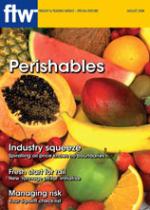SPIRALLING OIL prices know no
discriminatory boundaries. The
impact on global shipping and other
transport sectors is significant and
it’s a scenario that does not augur
well for the future, says Ian Fairlie,
Safmarine’s reefer trade manager for
sub-Saharan Africa.
Indeed, he believes it is likely to
become worse before it gets better
as demand, driven in the main by
the ‘roaring
giants’ China and
India, outstrips
supply.
“Oil prices
are certainly
impacting on the
reefer business
by increasing
our cost and we see it increasing
further.” ($143 a barrel at the time
of this writing).
Safmarine’s floating bunker
adjustment factor is directly linked
to the price of oil, therefore a higher
oil price means an increased BAF, for
which the customer is responsible.
The new floating BAF calculation
has been implemented on
Safmarine’s North America, Middle
East and Far East services so far,
with other trades to be incorporated
in the near future. This includes
the Europe service which accounts
for around 60% of the line’s reefer
services out of South Africa.
Fairlie says the world reefer
industry is “reasonably strong”, the
entire sector growing between 5%
and 8% last year, while Safmarine’s
global reefer growth outperformed
this and is likely to see similar
growth for 2008.
He explains global reefer growth
represents a combination of
container and breakbulk volumes.
Safmarine is no different in that
growth stems from conversion of
breakbulk into containerised cargo.
The swing from
conventional fruit
shipping - that is
largely refrigerated
underdeck - to
containers has
been remarkable,
with containerised
citrus volumes out
of South Africa commanding some
72% of citrus exports (Source:
PPECB). Between 80% and 90%
of the deciduous market has been
converted from breakbulk to reefer.
Nevertheless, Fairlie does not
believe this points to the writing
on the wall for the conventional
shipping mode, which will still have
a role to play, albeit diminished.
South Africa is the major player
in Fairlie’s portfolio, accounting
for 80% of outbound reefer trade,
followed by Senegal, Ghana, Ivory
Coast, Kenya
and Mauritius.
South Africa is the dominant importing force (largely frozen
beef and poultry from Brazil and
Argentina), followed by Namibia
(the same commodities), and
Angola assuming increasing status
with frozen South American meat
imports and a significant trade from
Europe, given Portugal’s erstwhile
connection with the West
African country.
Of note, from Safmarine’s reefer
business perspective, is that services
to Europe and the Middle East have
grown at the expense of North
America and the Far East during
the first six months of the year,
driven by favourable citrus prices,
particularly for lemons, in Europe.
World reefer industry ‘reasonably strong’
15 Aug 2008 - by Ray Smuts
0 Comments
Perishables 2008

15 Aug 2008
15 Aug 2008
15 Aug 2008
15 Aug 2008
15 Aug 2008
15 Aug 2008
15 Aug 2008
Border Beat
Featured Jobs
New
New
New
New
